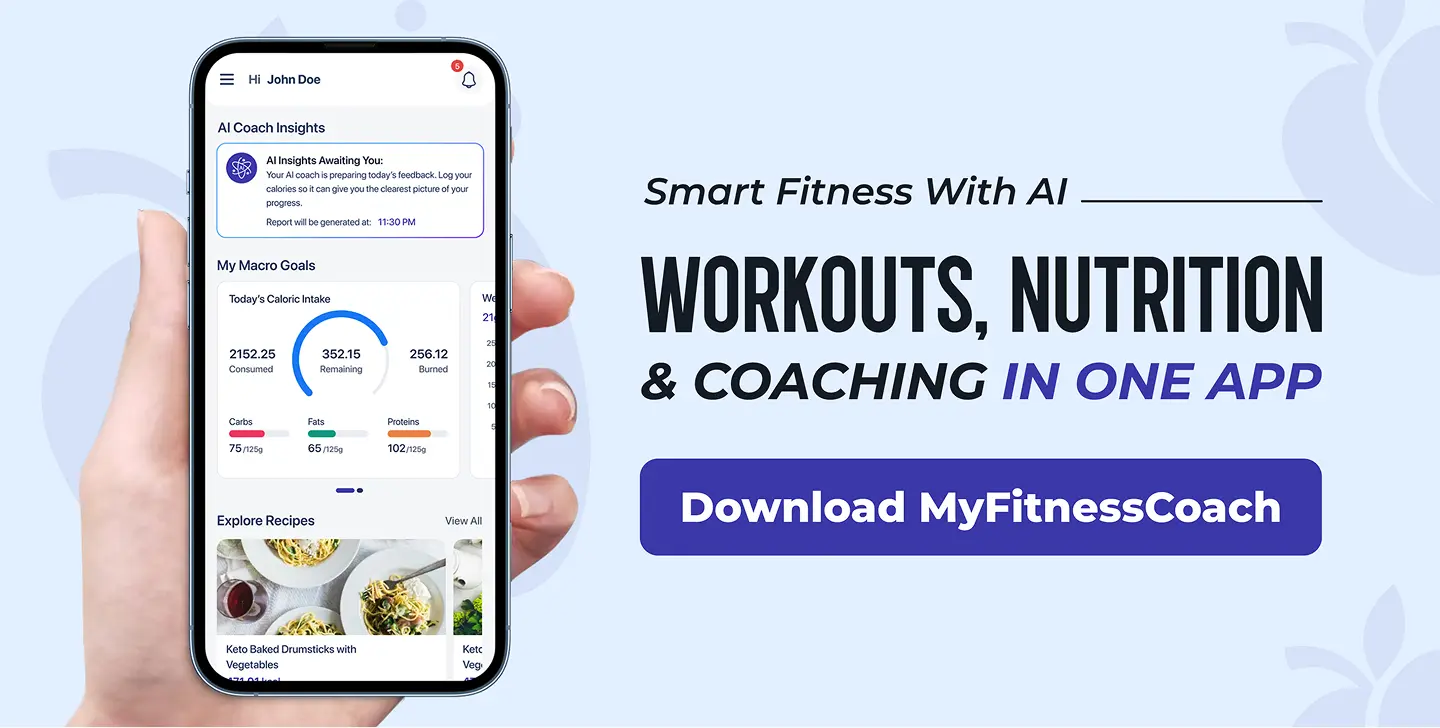How Many Calories Should I Eat to Lose Weight?

MyFitnessCoach
September 19, 2023
Many individuals struggle to lose excess weight, yet the path to achieving this goal can often be confusing. An essential aspect of weight management revolves around the number of calories you take into your body. In this article, we will understand the science of calorie consumption for the purpose of weight reduction with some uncomplicated steps. Our aim is to provide clarity and help you grasp the appropriate calorie intake required to shed those extra pounds.
How Many Calories Do You Need?
You need to take into account various factors if you want to learn the number of calories that's just right for your weight loss journey. These factors include your age, whether you're a man or a woman, how much you weigh, how tall you are, how active you are, and how your body processes energy. Let's break this down into simpler terms.
- Basal Metabolic Rate (BMR): Your BMR is the number of calories your body needs to maintain basic functions like breathing and maintaining body temperature. It's influenced by your age, gender, weight, and height.
- Physical Activity: The number of calories your body uses up during physical activities, like exercising and your everyday chores, depends on how much movement and activity you engage in.
- Thermic Effect of Food (TEF): Your body uses energy to digest and process the food you eat. This accounts for a small portion of your daily calorie expenditure.
- Weight Loss Goal: The rate at which you want to lose weight also plays a role. A gradual, sustainable weight loss plan typically involves a smaller calorie deficit than a rapid weight loss plan.
To get a general idea of the number of calories your body requires each day, you have a couple of options. You can use online tools that are designed to estimate your calorie needs, or you can reach out to a registered dietitian for personalized guidance. When you consult with a registered dietitian, they will take into account your unique situation and provide you with a recommended daily calorie goal that suits your needs.
Creating a Calorie Deficit
Now that you understand how many calories your body requires each day, the next important step is to create a calorie deficit. This means that when you want to lose weight, you should try to consume fewer calories than your body uses up. A helpful rule of thumb is to target a calorie deficit ranging from 500 to 1,000 calories daily. This approach can result in gradual and sustainable weight loss, typically equating to shedding around 1 to 2 pounds per week.
Here's a simple example:
Let's say your estimated daily calorie needs to maintain your current weight are 2,000 calories. To lose 1 pound per week, you'd need to create a deficit of approximately 500 calories per day. This means you should aim to consume around 1,500 calories per day to achieve your weight loss goal.
However, it's essential to note that extreme calorie restriction can be unhealthy and unsustainable in the long run. Consuming too few calories can lead to nutrient deficiencies and metabolic slowdown. It's important to strike a balance that supports your weight loss goals while providing your body with the nutrients it needs.
Quality Matters
The quantity of calories you eat plays a vital role in your weight loss journey, but it's equally, if not more, important to consider the quality of those calories. Calories are not all the same. Some foods are packed with essential nutrients, like fruits, vegetables, lean proteins, and whole grains. These foods not only supply your body with energy but also contribute to your overall well-being and health.
On the other hand, when you consume foods that are loaded with extra sugars, unhealthy fats, and calories empty of essential nutrients, it can result in an increase in body weight. These types of foods may not provide the same level of satisfaction for your hunger as nutrient-packed alternatives. Hence, it is important to emphasize the importance of making wholesome and nourishing choices in your diet, even if you're following your calorie deficit plan.
Balancing Macronutrients
To start your weight loss journey and get significant results, it's useful to consider the distribution of macronutrients (carbohydrates, proteins, and fats) in your diet. Here's a simplified breakdown of their roles:
- Carbohydrates: Carbs are your body's primary source of energy. Opt for complex carbohydrates like whole grains, fruits, and vegetables, which provide sustained energy and fiber to keep you feeling full.
- Proteins: Protein is essential for muscle repair and growth. Including lean protein sources like chicken, fish, beans, and tofu in your diet can help maintain muscle mass while losing fat.
- Fats: Healthy fats, such as those found in avocados, nuts, and olive oil, are necessary for overall health and can help you feel satisfied. Avoid trans fats and limit saturated fats.
Discovering the perfect balance among these macronutrients can help you manage the number of calories you consume. Always ensure that you receive the essential nutrients required to strengthen your efforts in losing weight and promoting your general health.
Monitoring Portion Sizes
In addition to giving thought to the nutritional value of the calories you consume and ensuring a good balance of carbohydrates, proteins, and fats, it's equally important to manage the amount you eat. Even foods that are considered healthy can lead to weight gain if you eat them in larger quantities than your body needs.
Here are some simple tips for managing portion sizes:
- Use smaller plates: Opt for smaller serving dishes/plates to naturally limit your portions.
- Measure your food: Try using measuring cups and a kitchen scale to ensure accurate portion sizes.
- Be mindful: Pay attention to your body's hunger and fullness signs. Stop eating when you're satisfied, not when your plate is empty.
- Avoid mindless eating: Limit distractions while eating, such as watching TV or scrolling through your phone. Eating with awareness can help you gauge when you're full.
- Don't skip meals: Skipping meals can lead to overeating later in the day. Aim for regular, balanced meals and snacks to maintain stable energy levels.
Adapting to Your Body's Needs
Understanding how your calorie requirements can evolve as you advance in your weight loss journey is important. As you successfully shed pounds, always be mindful that your Basal Metabolic Rate (BMR) may reduce due to the decrease in your body mass that requires sustenance. Consequently, this implies that you might need to periodically adapt and fine-tune your daily calorie intake to sustain a steady and healthful rate of weight loss.
Moreover, as time goes by, your level of physical activity might change, highlighting the importance of periodically reviewing your calorie requirements. Seeking guidance from a registered dietitian is highly encouraged for making these adjustments to your specific situation and needs.
The Role of Exercise
Diet plays a crucial role in losing weight, but adding regular physical activity to your routine can speed up your journey and enhance your overall well-being. Exercise does several beneficial things: it helps your body use up more calories, develop lean muscle, give your metabolism a boost, and raise how much energy you use.
Exercise is not a one-size-fits-all situation, so it's a good idea to discover activities that you like and can continue doing over a long time. For the best outcomes, try to include a mix of activities such as cardiovascular exercise (such as walking, jogging, or riding a bike) and strength training (using weights or doing exercises with your own body weight).

Read More Informative Blogs At: MyFitnessCoach.Fit
Frequently Asked Questions
Similar Articles
Stay informed with these similar articles.

MyFitnessCoach
October 18, 2023
What Does Body Goals Mean? A Path to a Healthy Lifestyle
In the world we live in now, lots of people talk about "body goals," which means having a body that's seen as perfect. On social media, in magazines, and on TV, we see lots of pictures of people with what seems like perfect bodies, which makes us feel like we have to look like them. But the real meaning of "body goals" is more than just looking good. It's about taking care of your whole self, not just how you look. In this article, we will discuss what does body goals actually mean and how you can achieve your body goals. Let’s get started:
.webp&w=3840&q=75)
MyFitnessCoach
September 5, 2023
How Much Protein in an Egg | The Nutritional Power
Eggs have long been a breakfast favorite for many, and for good reason. They're not only delicious but also packed with essential nutrients, making them a versatile and nutritious addition to your diet. One of the most common questions about eggs is, "How much protein is in an egg?" In this comprehensive guide, we'll delve into the world of eggs and explore their protein content, nutritional benefits, and how they can contribute to a balanced diet.

MyFitnessCoach
May 18, 2023
Fitness Guide: How Do I Start A Weight Loss Journey
Ready to start on a life-changing weight-loss journey? Congratulations for taking the first step towards being a better and happier version of yourself! Starting off a weight-loss journey may be both satisfying and stressful. With so much information available, having a well-defined plan and trusted assistance in achieving your goals is important. This article will help you start your weight-loss journey and achieve the results you desire.
